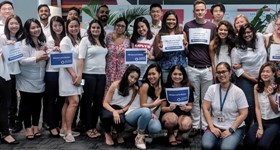Inspirational Women In Life Sciences

When we look back on the history of life sciences, there are so many women whose names are written in the books of history. To celebrate International Women’s Day, we look at five women whose work has contributed to the industry today.
Why International Women’s Day resonates with Real Staffing
As a leader in Life Sciences recruitment, we provide an inclusive and balanced working environment for our entire team, and this resonates closely with our #InspiredByYou mantra. Without the pioneering work of the women in Life Sciences, the world would be lacking in some massive historical breakthroughs. We look at five of our most inspirational women in the history of Life Sciences.
Rosalind Franklin
With International Women’s Day’s #BalanceForBetter campaign driving our thinking, this list would be incomplete without highlighting the work of Rosalind Franklin.
Rosalind Franklin’s X-Ray diffraction images of DNA, led on to the discovery of the molecule’s double helix structure. As her work is usually recognised as Crick and Watson’s discovery, Rosalind Franklin actively protested against lower pay for women, and had her work published in top scientific journals.
After her work on DNA, Rosalind Franklin pioneered the work of molecular structures of viruses. Following her death, her mentee, Aaron Klug continued her research and went on to win the Nobel Prize in Chemistry in 1982.
Dorothy Hodgkin
The study of diabetes was massively helped by Dorothy Hodgkin’s work by deciphering the structure of Insulin. Her work in X-Ray crystallography also helped to determine the structures of vitamin B12, penicillin, and the first publication of a steroid’s structure (cholesteryl iodide). Her work in Chemistry earned her the Nobel Prize in 1964, and she is considered as a pioneer of X-ray crystallography studies of biomolecules, which became an essential tool in the field of structural biology.
Marie Curie
As the first woman to win a Nobel prize, Marie Curie’s work in radioactivity has earned her reputation in human history. She was the first person to ever win the Nobel prize twice and is the only person to win for her work in two different sciences. Her work led to the discovery of polonium and radium, and she developed the first mobile X-ray units, which were used in the first world war.
Aside from her ground-breaking work in Life Sciences, she proved that she could balance her work life with her family. Marie Curie’s close relationship with her family led on to inspire her daughter’s successful career in chemistry, which she also won the Nobel prize for in 1935, for her work in artificial radioactivity. This made the Curies the family with the most Nobel laureates to date.
Gertrude B. Elion
Real Staffing are proud to work with pharmaceutical companies who try and change the future of health care, which is why Gertrude B. Elion is such an inspiring woman to include in this list. She was integral to the creation of the first immunosuppressive drug, and also developed the first successful antiviral drug. Her innovative research methods also lead to the development of the AIDS drug ‘AZT’.
Her motivation runs parallel to Real Staffing’s ‘Inspired By You’ mantra, as the loss of her grandfather to cancer inspired her to work towards curing the disease.
Her work with George H. Hitchings and Sir James Black earned her the 1988 Nobel prize. Throughout her career, her inventions in drug development created some of the first treatments for leukaemia, gout, malaria, herpes, meningitis and organ-transplant rejection.
Her work in purines led to the creation of two anti-cancer drugs, which helped bring her closer to her goal of helping to cure the disease in memory of her grandfather.
Ada Lovelace
Championed as the creator of computer programming, Ada Lovelace was an English mathematician who was the first to recognise the potential of Charles Babbage's proposed mechanical general-purpose computer. In 1842, she discovered that the machine could be used for more than just calculation, and was the first person in history to create an algorithm to be carried out by a machine.
It was her approach to her work which changed the way society related to technology. Her notes showed that she had predicted how people could interact with technology as a collaborative tool, and it’s this mindset which has led to the invention of the Digital Health industry. Almost 200 years after her discovery, we are seeing the first generation of people to grow up with technology being an integral part of their lives, and how it can work alongside human lifestyles. Where Charles Babbage is hailed as ‘The Father of Computers’, it was Ada Lovelace’s approach to how it can work alongside society, which has helped this industry thrive.
Are you considering a career in life sciences? Have a look at our vacancies, and maybe you will make this list in the future!




